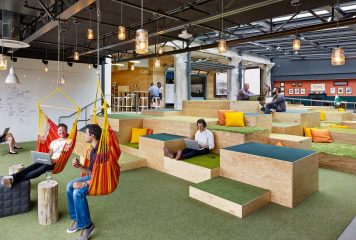I am delighted to welcome you to Building Futures, our in-depth study of what it will take to attract the next generation of talent to the real estate and construction sector.
The built environment is without doubt in the process of its most rapid period of change in living memory – and perhaps ever! The pandemic has permanently altered the way we live, work and shop, which has transformed the way we think about our buildings and how we deliver them.
As Barry Hoffman of Landsec tells us (p. 5), it’s no longer enough to just deliver the building. Developers must now mould places and experiences for a public that lives for them. If that sounds challenging, it’s because it is! Today’s world is an ambiguous place and we need young people able to interpret what to do next, says Hoffman.
It’s a theme that runs throughout our interviews with the sector’s leaders and is being felt across funders, developers, contractors and the various consultants that make up our industry. It requires different thinking. Data can provide many answers, but as Matt Bennion, chief executive of Reds10 tells us (P. 21), the real diamonds are those with the emotional intelligence not just to make the data usable, but to know what it’s really telling us.
These are to some extent skills that were already richly valued by the leaders we work with, however the pace of change will require a step up in the number of appropriately skilled young people our education system produces. It’s not just university graduates either. Vocational courses are too computer based and are failing to deliver enough of the real-life experience that will equip candidates for an industry in flux, according to Bennion.
The office, leaders tell us, can fill some of the gaps (p. 19). A big lesson of the past 18 months has been quite how many tasks you can do from home, but remote work comes at the expense of the vital informal training the young get by watching their more experienced colleagues succeed and fail. Young people, too, tell us they are eager to get back (p. 8).
What they will find when they get there is a permanently altered place (p. 12). The pandemic has placed an outsized burden on many, but particularly women and the young. As a result, the ‘human’ element of the workplace has risen to the top of the agenda. Large corporates are placing childcare and aging care facilities on site, while working on methods to get young people more face time with leadership teams. The digital office, too, is getting an overhaul. Online 3D virtual platforms that enable staff to join virtual office spaces and ‘thinking rooms’ via an avatar will become common place in the years ahead.
There are a number of areas in which the industry is falling short. Though it is becoming more diverse and inclusive, change has been too slow in coming (p. 25).
Meanwhile it’s clear we could all do a better job of communicating the sheer breadth of the jobs on offer. Without more work we’ll continue to lose some of the best and brightest minds to banking, tech and law.
Most heartening are the words of some of our industry’s rising stars (p. 8). By their own account, they are a demanding generation, particularly when it comes to flexible working. They want a say on issues that impact them. Businesses that accommodate them will be the ones that thrive in the years ahead. That will be a test for some in leadership positions, but it is clear this is a generation with the desire to engage and shape the industry for the better – to create a more diverse industry that is an even greater force for good within the communities in which it operates. That is a future we should all want to build.
Toby Turner
Founder & Managing Director Holtby Turner



